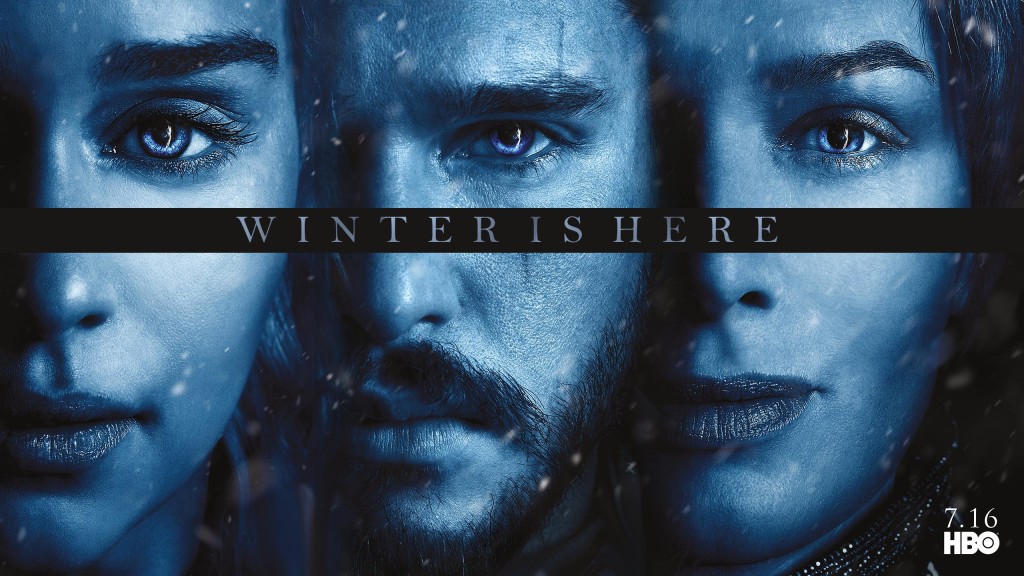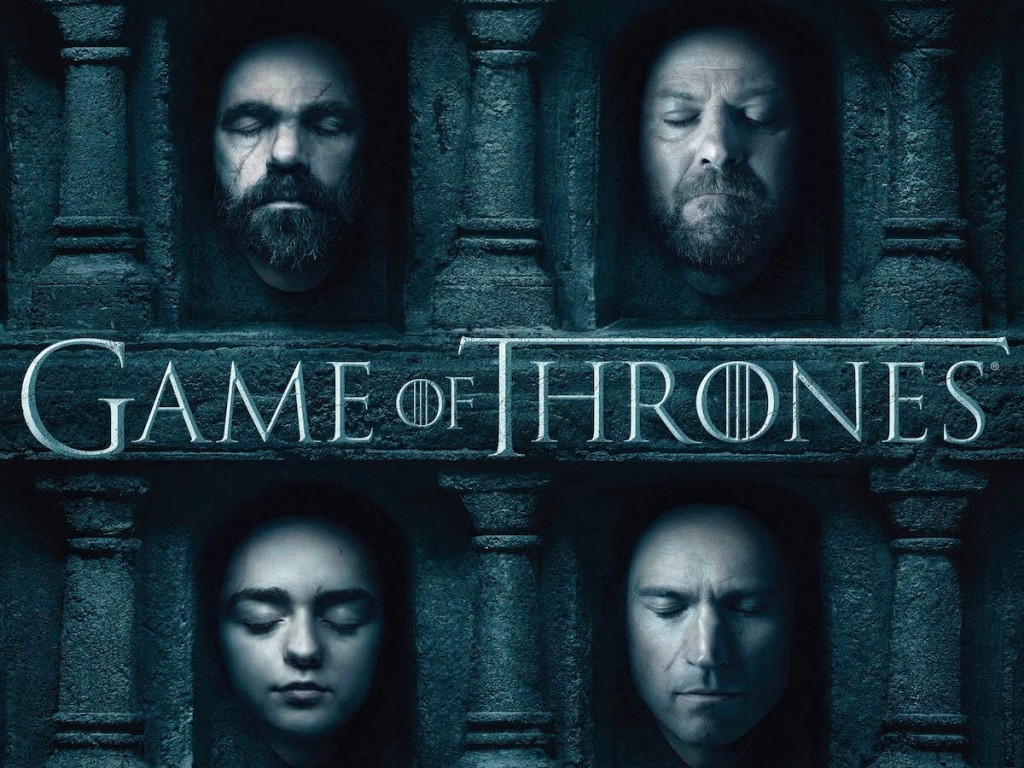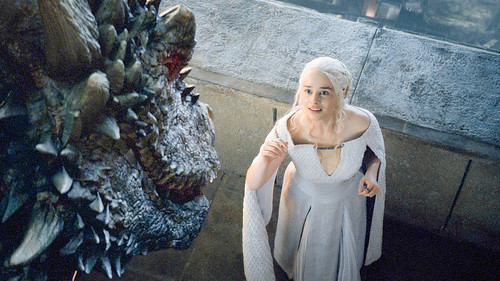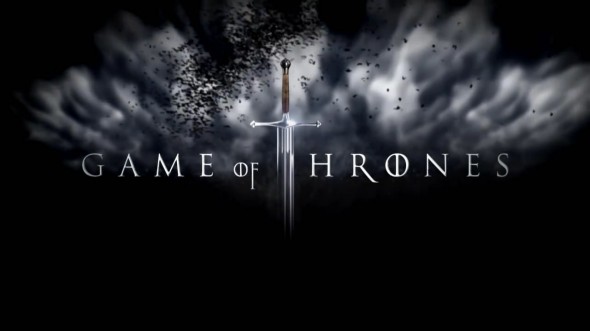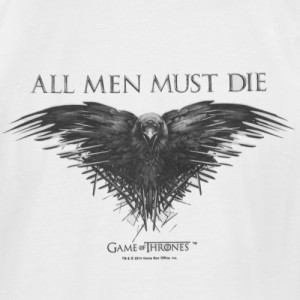
HERE BE LOTS OF SPOILERS.
Another season of Game of Thrones has ended, and with it many lives — and many shits — were lost. But we kept our heads all season (see what we did there) and have compiled for you this handy glossary. Enjoy!
Book of Brothers
Joffrey [to Jaime]: “So this is the famous Book of Brothers. All the great deeds of all the great Kingsguard, huh?
“Two Swords,” April 6, 2014
The Book of Brothers, also called the White Book (after the white cloaks of the Kingsguard), “is the tome that records the deeds of every knight who has ever served in the three hundred year history of the Kingsguard.” In the Book of Brothers, Jaime has only half a page, as Joffrey helpfully points out.
Children of the Forest
Child of the Forest: “The first men called us the Children, but we were born long before them.”
“The Children,” June 15, 2014
The Children of the Forest are a mysterious race of creatures “that were reportedly the original inhabitants of the continent of Westeros.” and have been written off by most as mythic or extinct.
UPDATE: Jennifer Vineyard at Slate has a lot more on the Children of the Forest. The Children of the Forest are the ones who planted the weirwood heart trees and carved the faces in them, so they could keep watch,” who “helped fight back the White Walkers during the Long Night,” and “gave the Night’s Watch the dragonglass to keep [the White Walkers] at bay.”
The Citadel
Prince Oberyn: “The King was poisoned.”
Lord Tywin: “I hear you studied poisons at the Citadel.”
Prince Oberyn: “I did. This is why I know.”
“Breaker of Chains,” April 20, 2014
The Citadel is the seat of the Order of Maesters, “‘an order of scholars, healers, and learned men’ who focus on scientific knowledge and have only a ‘disdaining belief in magic.’”
The common citadel refers to “a fortress in a commanding position in or near a city,” or “a stronghold or fortified place; a bulwark.” The word comes from the Italian cittadella, diminutive of città, “city.”
Craster’s Keep
Jon Snow: “Brothers, I’m going beyond the Wall to Craster’s Keep. I’m going to capture the mutineers holed up there. Or kill them.”
“Oathkeeper,” April 27, 2014
Craster’s Keep is the “small, fortified homestead of” Craster, a wildling who has the habit of taking his own daughters as his wives and sacrificing his sons to the White Walkers.
Dornishmen
Bronn: “How many Dornishmen does it take to fuck a goat?”
“Two Swords,” April 6, 2014
Dorne is a “constituent region” of the Seven Kingdoms, with “a unique culture, law, and ethnic background.” The Dornish “have more ‘relaxed’ views towards sexuality and love than the rest of Westeros,” including holding paramours, or the unmarried lovers of noble men and women, in the same regard as spouses; having no particular stigma against homosexuality; and raising bastards without stigma and alongside “their trueborn siblings and cousins.”
These “relaxed” views are probably what perpetuates jokes about Dornishmen having sexual relations with livestock.
Drowned God
Theon Greyjoy: “I am your prince. I swear it by the Drowned God. What is dead may never die.”
“The Mountain and the Viper,” June 1, 2014
The Drowned God is worshiped by the inhabitants of the Iron Islands, “one of the few regions in Westeros not abiding by the main religion of the Seven Kingdoms, the Faith of the Seven.” The North is another such region, “where the worship of the Old Gods of the Forest remains strong.”
What is dead may never die is the start of a common prayer that has the responding line, “But rises again, harder and stronger.”
giants
Janos Slynt [as Giants approach the gate of the Wall]: “No such thing as Giants. Stories for the children.”
“The Watchers on the Wall,” June 8, 2014
Giants are thought by many to be the stuff of myth. However, as evinced by this episode, they exist “in the furthest north Beyond the Wall.” It’s said that Hodor, a “simpleminded” yet gargantuan servant from House Stark, is part giant.
Apparently, Giants “are very shy” but “their shyness can quickly turn into rage.” Moreover, the Free Folk, or wildlings, “believe giants were enslaved with magic to get them to build the Wall.”
The characteristics of giants differ across various mythologies. While in Norse and Welsh myths, giants are, well, gigantic, in ancient Greek tales, they “were a race of great strength and aggression, though not necessarily of great size.”
Gigantomachy, which comes from a Greek phrase meaning “giant battle,” is “the mythological war of the giants against Zeus, symbolizing the antagonism between terrestrial and oceanic and celestial forces.”
Iron Bank of Braavos
Ser Davos: “I suppose if you work for the Iron Bank of Braavos, and each one of your gold bars is worth half a kingdom, you tend not to be overly concerned with the kind of distinction. . . .I need you to write a message.”
“Breaker of Chains,” April 20, 2014
The Iron Bank of Braavos is “the most powerful financial institution in the Known World,” and says of clients who fail to pay back their loans, “the Iron Bank will have its due.”
Find out how the Iron Bank stacks up against powerful real-life financial institutions.
King-Beyond-the-Wall
Stannis Baratheon: “You’re the King-Beyond-the-Wall? Do you know who I am?”
“The Children,” June 15, 2014
The King-Beyond-the-Wall is Mance Rayder, the leader of the Free Folk or wildlings. He has managed “to unite a significant number of the northern tribes under his command, enough to pose a threat to the Seven Kingdoms south of the Wall.”
Moon Door
Robin: “It was already ruined because it didn’t have a Moon Door! I was fixing it!”
“Mockingbird,” May 18, 2014
The Moon Door is located in the floor of The Eyrie, the “principal stronghold of House Arryn,” which sits atop a mountain. The Moon Door opens to reveal a very long drop and is the execution of choice for Lady Arryn, ironically enough.
Lady Arryn has said that those dropped through the Moon Door “break apart.” However, according to Time, if the distance from the Moon Door to the ground below is “more than 2,000 feet,” the faller “would reach 125 miles per hour, which means broken bones and near-certain death — but not necessarily breaking into pieces.”
In addition, “such a fall wouldn’t be a 100% guarantee of death”:
During World War II, for example, there were lots of people falling out of burning airplanes — and, though many of them died, a lucky few survived, often thanks to a combination of factors that slowed their falls.
However, we doubt that Lady Arryn will be making a comeback.
Purple Wedding
“Aside from the bridegroom’s customary torture-tainment, everyone was on their best behavior … until the wine started flowing, and we realized why fans have dubbed this the Purple Wedding.”
Drusilla Moorhouse, “‘Game of Thrones’ kicks off a murder mystery with the Purple Wedding,” Today, April 13, 2014
The Purple Wedding refers to the wedding between King Joffrey and Margaery Tyrell, which takes place during the episode, “The Lion and the Rose.” The wedding is so-called by fans of the A Song of Fire and Ice novels due to the poisoned wine that is used to kill Joffrey and the association of the color purple with royalty. The televised version plays this up: Joffrey’s face turns a grotesque shade of purple as he dies.
Why is purple associated with royalty? Back in the day, purple dye was expensive and difficult to make. According to Live Science, the dye initially used to make the color purple was obtained “from a small mollusk that was only found in the Tyre region of the Mediterranean Sea.”
Like the Red Wedding, the Purple Wedding was inspired by a historical event. A Song of Fire and Ice author George R.R. Martin explained to Entertainment Weekly that he based Joffrey’s death “on the death of Eustace, the son of King Stephen of England.” Eustace “choked to death at a feast,” which people are still debating about a thousand of years later: “Did he choke to death or was he poisoned?”
Sand
Cersei Lannister: “Can’t say I’ve ever met a Sand before. I’m not quite sure what to call you.”
Ellaria Sand: “‘Ellaria’ works for everyone else.”
“Two Swords,” April 6, 2014
Each House in Westeros has a special name for their noble-born bastards, children born out of wedlock between a noble and non-noble. The monikers each have to do with geographic characteristics of each house or region: Snow for the North; Waters for The Crownlands; and Sand for Dorne.
In England during Anglo-Saxon times, “the descendants of kings were called aethelings, whether legitimate or not.” Those born “illegitimately,” also known as royal bastards, often had the surname Fitzroy, which ultimately comes from the Latin fils, son, and regalis (by way of the French roial), “of a king, kingly, royal, regal.”
Slaver’s Bay
Daenerys: “How can I rule seven kingdoms if I can’t control Slaver’s Bay?”
“First of His Name,” May 4, 2014
Slaver’s Bay is “the hub of the international slave trade” and may be based on the slave coast of Africa.
Thenn
Tormund Giantsbane: “Thenns. I fucking hate Thenns.”
“Two Swords,” April 6, 2014
The Thenns are an advanced and disciplined wildling tribe, who engage in “self-scarification as well as cannibalism, feasting on the flesh of their enemies.” Evidence has been found that real-life ancient Britons also engaged in cannibalism, perhaps for the purpose of removing competing groups and getting more food, and of gaining the enemy’s power.
trial by combat
Tyrion: “I will not give my life for Joffrey’s murder and I know I’ll get no justice here. So I will let the gods decide my fate. I demand a trial by combat.”
“The Laws of Gods and Men,” May 11, 2014
Trial by combat is, according to Tyrion Lannister, “deciding a man’s guilt or innocence in the eyes of the gods by having two other men hack each other to pieces.” But the practice has real medieval history.
According to The Atlantic, in ancient England, trials by ordeal were more common than trials by combat. Such ordeals included:
pluck[ing] a stone from a cauldron of boiling water, oil, or lead; if their skin didn’t burn off, they were judged innocent. In other cases, the guilty were believed to be those who suffered grave injuries from walking across hot iron, or ingesting poison.
Injuries from walking across hot iron or ingesting poison? You mean like any normal person? It seems that if you were sentenced to trial by ordeal, you were SOL.
Trial by combat, The Atlantic continues, “happened less frequently…but persisted in history for longer.” A historical example is that “of a Flemish murder inquiry in the 12th century that was resolved in a duel distinctly recalling the one” on Game of Thrones,” in which when opponent was about “to deliver the coup de grâce,” the other “reached up and grabbed [his] testicles, held on to them tight, and then shoved [the man] aside without loosening his grip.” The man with “all his ‘lower parts broken apart’” had to admit defeat.
Usurper
Daenerys [to Ser Jorah Mormont]: “Why did the Usurper pardon you?”
“The Mountain and the Viper,” June 1, 2014
Usurper “is a derogative term that refers to individuals who have seized power in opposition to a ‘legitimate’ or ‘rightful’ ruler.” It’s also what Daenerys, her brother, and House Targaryen loyalists call King Robert Baratheon, who took the Targaryen throne by force.
The word usurper comes from the Latin usurpare, “to seize for use, to use.”
white cloak
Sir Tywin [to Jaime]: “You’ll remove your white cloak immediately. You will leave King’s Landing to assume your rightful place at Casterly Rock. You will marry a suitable woman and father children named Lannister, and you’ll never turn your back on your family again.”
“The Laws of Gods and Men,” May 11, 2014
Members of the Kingsguard, “an elite group of seven knights” whose sworn duty “is to protect the king and the royal family from harm at all times,” dress in “gold plate and scale armor with white detailing and white armor,” thus gaining the nicknames, White Swords or White Cloaks.
The Kingsguard are like the Night’s Watch in that they “are sworn for life and are forbidden from owning land, taking a wife, or fathering children.” But while the Kingsguard are “supposedly the greatest and most skilled warriors in all of Westeros,” the Night’s Watch — who dress all in black, and thus are also called crows or black brothers — are “comprised of criminals avoiding corporal punishment or nobles avoiding scandal.”
